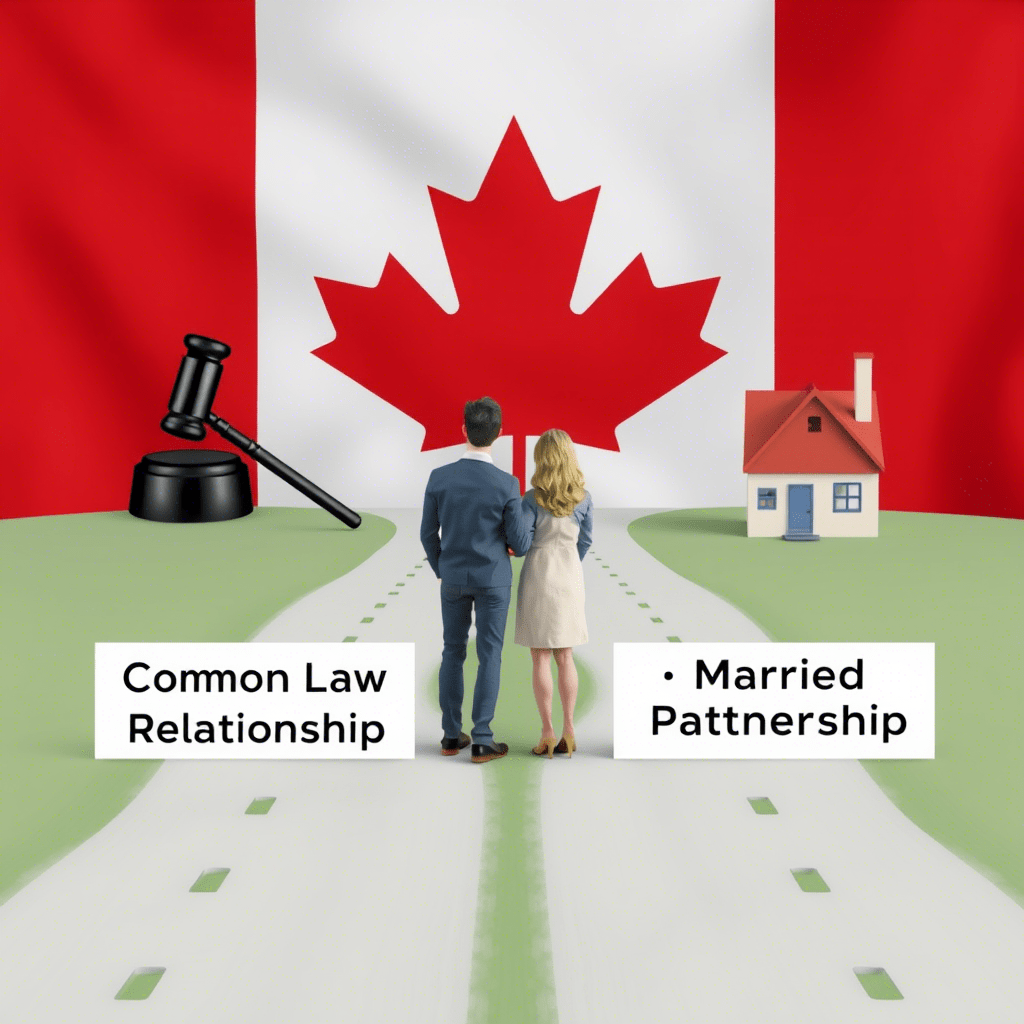
Common Law vs Marriage: What You Need to Know in Canada
Understanding the legal implications of common law vs marriage is essential for couples in Canada. While many partners live together without marrying, the differences between these two relationship types can have a significant impact—especially in terms of property division, spousal support, parenting rights, and inheritance.
Whether you’re living with a partner or already married, knowing how common law vs marriage is treated under Canadian law can help you make informed decisions.
Whether you’re considering living with a partner, currently in a common law relationship, or going through a separation, it’s important to understand the legal differences between common law and marriage in Canada.
What Is a Common Law Relationship in Canada?
A common law relationship typically involves two people living together in a marriage-like relationship without being legally married.
In most Canadian provinces, including Ontario, you’re considered common law for family law purposes if:
- You have lived together for at least three years, or
- You have a child together by birth or adoption, and live in a relationship of some permanence.
Each province may define common law differently depending on the legal issue (e.g., taxes, benefits, or family law), so it is best to consult a local family lawyer in Ontario or your province.
Key Legal Differences: Common Law vs Marriage
1. Property Division Upon Separation
Under Ontario’s Family Law Act, married couples are entitled to an equalization of net family property. This means any increase in the value of property acquired during the marriage is shared equally, regardless of whose name is on the title.
In contrast, common law partners are not automatically entitled to property division. If one partner owns the home, the other may not have a claim unless they can prove one of the following:
- Unjust enrichment
- Constructive trust
- Resulting trust
This makes property disputes in common law relationships more complex. A cohabitation agreement can help protect both partners’ interests.
2. Spousal Support Rights
Both married and common law spouses may be entitled to spousal support after separation. For common law partners, eligibility usually requires:
- At least 3 years of cohabitation, or
- Having a child together and living in a relationship of some permanence
Court decisions depend on factors like:
- Length of the relationship
- Financial dependency
- Roles during the relationship
- Economic disadvantage after separation
3. Parental Rights and Child Support
There is no legal difference between married and common law parents regarding:
- Child custody (decision-making responsibility)
- Parenting time
- Child support
👉 Did you know? Child support is the right of the child and cannot be waived by either parent—even in a cohabitation agreement.
4. Inheritance and Estate Rights
Married spouses are legally entitled to inherit under provincial succession laws if their partner dies without a will.
Common law partners, however, do not have automatic inheritance rights. Unless named in a will, a surviving common law spouse may need to make a dependent’s support claim to the estate.
✳️ Tip: If you’re in a common law relationship, it’s crucial to have a valid will and power of attorney.
Do You Need a Cohabitation Agreement?
A cohabitation agreement is a legally binding contract between partners in a common law relationship. It protects your rights in the event of a breakup or death and can include terms about:
- Property ownership and division
- Spousal support rights
- Division of debts
- Household contributions
- Inheritance and death benefits
You can also convert a cohabitation agreement into a marriage contract if you choose to marry later.
Common Law vs Marriage: Quick Comparison Chart
| Legal Issue | Common Law | Marriage |
|---|---|---|
| Property Division | Not automatic | Equalization of net family property |
| Spousal Support | After 3 years or with a child | Immediately upon separation |
| Child Support & Parenting | Same rights and responsibilities | Same rights and responsibilities |
| Inheritance (No Will) | No automatic rights | Statutory entitlements |
| Tax & Benefits | Recognized after 12 months or with a child | Full recognition |
| Legal Documentation | Cohabitation Agreement (optional) | Marriage Certificate |
Why Legal Advice Matters
The line between common law and marriage can be blurry, but the legal consequences are not. Whether it’s about property, children, or support, understanding your rights is essential—especially when relationships end.
At IQBAL LAW, we assist clients across Ontario with:
- Understanding rights in common law and married relationships
- Drafting cohabitation and marriage agreements
- Handling spousal and child support claims
- Property division and trust claims in separations
Final Thoughts
Whether you’re in a marriage or a common law relationship, legal planning is key. The earlier you seek advice, the better prepared and protected you’ll be.
Need personalized legal help? Contact IQBAL LAW today to book your confidential consultation.
DISCLAIMER: This article is for informational purposes only and does not constitute legal advice. No lawyer-client relationship is created. Consult a qualified lawyer for advice specific to your situation. The firm and author disclaim liability from reliance on this content.